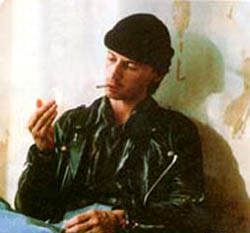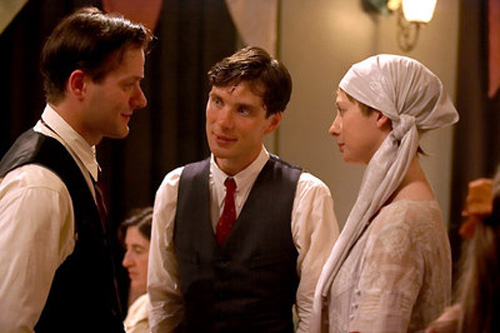|
"I don't have time to fight for the working class! I am the working class."
–Ken Loach
Back in Athens, and during the last few weeks I have seen more stunning and breath-taking films than I saw in five years in London.
The Panorama of European Cinema is a film festival dedicated to European and Greek Cinema, past and present. It has been organized for the last 20 years by "Eleftherotypia", one of the most prestigious Greek daily newspapers, in co-operation with the Ministry of Culture and a number of other Greek and foreign cultural institutions – the Greek Film Centre, the Greek Cinemateque, The Municipality of Athens, the British Council, the French Institute of Athens, The Italian Cultural Institute, the Goethe Institute and several Embassies. Throughout its 20 years of existence, the Panorama, the first and biggest film festival of Athens, has become a well-established cultural event that adds its own kind of "glamour" to the Athenian Cultural lifestyle. It has hosted an array of cinema legends — Michelangelo Antonioni, Harold Pinter, Arthur Penn, Terry Gilliam, Terry Jones, Stephen Frears, Emir Kusturica, Abbas Kiarostami, Karel Reiz, Roger Corman, Costa-Gavras, Francesco Rosi, Ettore Scola, Claude Sautet, Max Von Sydow, Agnes Varda, Elem Klimov, Goran Paskaljevic, Alfonso Guaron, and others, many of whom received the Panorama's Special Award for their contributions to the art of the cinema.
Opening the festival on the big screen was "4 Months, 3 Weeks and 2 Days" a Golden Palm-winning drama by Romania's Christian Mungiu, which takes a comic look at the story of a woman who helps her friend arrange an illegal abortion in 1980s Romania before the fall of Ceausescu.
This year's program of the 20th Panorama, apart from the customary new releases and the competition section with European productions whose rights have been purchased by Greek distributors, also offered a number of interesting tributes.
"Make Love Not War: The Age of Doubt – Then and Now" covered the hippie era, Woodstock, demonstrations against the Vietnam War, the May 1968 protests in France and the Watergate scandal, all the way to the globalization debate and the recent Guantanamo Bay scandal. Among the movies shown were: Dennis Hopper's "Easy Rider" (1969), D.A. Pennebaker's anti-Vietnam War musical documentary "Monterey Pop" (1968), Arthur Penn's "Alice's Restaurant" (1969) and Robert Altman's "MASH" (1970), among others.
"Cult Movies and B-Movies" presented horrors and science-fiction thrillers, to film noir and westerns. "Carnival of Souls" by Herk Harvey (1962), "A Bucket of Blood" by Roger Corman (1959), the B-western "Forty Guns" (1957) by Samuel Fuller, "Performance" (1970) by Donald Cammell and Nicholas Roeg and "Freaks" (1932) by Tod Browning were just some of the selections on the menu.
Avant-premieres included Shekhar Kapur's "Elizabeth: The Golden Age","Factory Girl," a biographical drama by George Hickenlooper, starring Sienna Miller and Guy Pierce; Ang Lee's war thriller "Lust Caution;" Golden Palm-nominated drama "Import/Export" by Austria's Ulrich Seidl; Manuel Huerga's portrait of Spanish anarchist and bank robber Salvador Puig Antich, "Salvador;" and Emir Kusturica's new drama, "Promise Me This."
But the real highlights were the special tributes of the festival to Bergman, Antonioni, Orson Welles and Ken Loach!
I had seen "Kes" and "Riff Raff" in the past, but not with the same outlook and long before I lived in England, which back then was the "past-Thatcher" country to me, not knowing yet the everyday reality of the "New Labour" Britain.
Britain with its wonderful health system, school uniforms, tea time, the lousy, lousy weather, the surveillance cameras everywhere, the high rents and upper stiff lip, the amazing theatres and cultural events - and Britain with an unbelievably large number of homeless people and beggars on the streets in spite of their well organized social system, with the lack of places at schools, the large number of teenage pregnancies and teenage alcoholism……and the feeling that everybody in this country is actually quite unhappy and that a term like "Standard Life" could stand for something people would settle for.
That is where Ken Loach came in once again, a résumé of British history.
Ken (Kenneth) Loach, the amazing film director who was born in Nuneaton, Warwickshire, near Coventry, in 1936.
 His father worked as an electrician in a tool machine factory and Loach has remained faithful to his working class beginnings throughout his career. Following two years of National Service, Loach studied law at St. Peter's Hall, Oxford, where he also became interested in theatre. He acted and directed in several repertory companies near Birmingham, then joined ABC Television as a trainee director in 1961. When the BBC prepared to launch its second channel in 1963, Loach switched networks. His father worked as an electrician in a tool machine factory and Loach has remained faithful to his working class beginnings throughout his career. Following two years of National Service, Loach studied law at St. Peter's Hall, Oxford, where he also became interested in theatre. He acted and directed in several repertory companies near Birmingham, then joined ABC Television as a trainee director in 1961. When the BBC prepared to launch its second channel in 1963, Loach switched networks.
In collaboration with story editor-turned producer Tony Garnett, Loach directed a series of stylistically ambitious films for "The Wednesday Play" that revolutionised British television drama and sparked intense political debate. Both committed socialists, Loach and Garnett hoped that their socially conscious dramas would inspire the working and middle classes to work for revolutionary economic change. At the same time, they synthesised features of Italian Neo-Realism (location shooting, casts of non-professionals) and the French New Wave (jump cuts, disjointed narratives) to produce a new form – the docudrama. Using documentary techniques to tell fictional stories, the films address a wide range of issues, including homelessness, teenage delinquency, union politics and abortion.
This aesthetic innovation achieved an emotional authenticity previously unseen, thereby taking British television off the stage and into the streets. He would direct a further nine between 1965 and 1971, arguably finding, during this time, the vision and voice that has defined his subsequent career. The most consequential of these teleplays was undoubtedly "Cathy Come Home". Regarding the issue of homelessness, Cathy was latched onto by various political institutions upon transmission, and this eventually led to the advent of the charity, "Shelter", something Loach refuses to take any credit for. Loach's "Up The Junction" and "Cathy Come Home" were the first 'Wednesday Plays' to escape the trappings of a studio set-up and, using genuine vox-pop interviews and statistics, was a ground-breaking piece of cinéma vérité-esque documentary fiction, which was to cause great debate over the very nature of television drama.
Also during this period, Loach had time to put his hand to the direction of his first feature film, "Poor Cow" (1967), although he felt that this film highlighted, if nothing else, his cinematic immaturity.
Troubled by his first foray into the cinematic world, Loach and Tony Garnett, with whom he had worked with on many of the Wednesday Plays, set up Kestrel Productions to actualize some low-key independent work. Their first film was "Kes", which many acknowledge as a pivotal film in the late 60's period of British cinema. It concerns the story of a boy who, facing little or no prospects in life, finds a 'creative' avenue through his training of a bird. The issue of hope, destiny and struggle in working class communities that is intrinsic to Kes has become the benchmark of Loach's cinema, what some have called 'social-conscience realism'.
 |
It wasn't until 1990, with the release of Hidden Agenda, a political thriller set in Northern Ireland about the British army's 'shoot-to-kill' policy, that Loach was able to make a film that regained the polemical edge of the best of his earlier work. It was written by Jim Allen, who was to script two more films for Loach in the '90s, and followed by the equally successful "Riff-Raff" (1991), the first of a series of films produced by Sally Hibbin's Parallax Pictures and photographed by Barry Ackroyd.

When Cannes jurors awarded the Palme d'Or last May to "The Wind That Shakes the Barley", Loach's militant, stirring drama of the Anglo-Irish War (1919–1921), it was a triumphant moment for the director, who had been nominated six times before. Yet the viciousness that greeted the British release of Barley just a week later was quite in shocking contrast to the mournful tone of the film. Loach had, of course, provoked the ire of right-wingers once before with his 1996 political thriller "Hidden Agenda," which impugned the UK's underhanded anti-terror policies in Northern Ireland. This time around, the indigestible morsel that stuck in the craw of many tabloid columnists and Tory hotheads was that Loach, a long-time socialist, had ostensibly painted colonial British forces as hateful, rampaging sadists, while blithely romanticizing the Irish republicans who fought for independence in the early 1920s.

Set in rural County Cork, Barley fictionalizes events at the height of Ireland's struggle for independence in 1920; two years after Sinn Fein won an electoral mandate for autonomy. Written with long-time collaborator Paul Laverty (Carla's Song, Land and Freedom) and gorgeously photographed in muted pastoral hues by Barry Ackroyd (United 93), the film revisits the period when the British Crown dispatched its notorious Black and Tans and Auxiliaries — mostly weary, decommissioned officers returning from the World War I trenches — to help local constabularies crush the breakaway movement. Before long, we're embroiled in the internecine conflicts that led to the year-long Irish Civil War in 1922 between pro- and anti-Treaty republican factions.
With "The Wind That Shakes the Barley", Loach has for the third time ventured into radical-history territory with a tale of revolution and a political dream deferred. (His previous efforts in this direction were "Carla's Song", which dramatized the 1980s Sandinista revolution in Nicaragua, and "Land and Freedom", the story of the anti-fascist International Brigades who fought for social-anarchist principles during the Spanish Civil War of the 1930s. Another film, "Days of Hope," a multipart series for the BBC on labour struggles of the early 20th century, briefly treated the Irish war for independence.) As always, there are no easy answers or resolutions: Barley's opening shot of a group of Irish villagers playing a traditional game of hurling (outlawed by the Brits, along with Gaelic and other forms of cultural identification) is an image of unity and collective strength that contrasts starkly with the downbeat tone of the last: a vignette of sour recrimination and anguish. It reflects, perhaps, Loach's own pessimism about the prospects for meaningful social change.
One can but admire Loach for relentlessly sticking to his task, repeatedly championing the underdog by revealing the hardships and struggles of those at the bottom of the social hierarchy. It is no accident that his best work has been produced at times of supposed affluence, in the mid '60s and the '90s, when he has often been a lone voice, bravely and resolutely standing up for the disadvantaged and the downtrodden. Few directors have been as consistent in their themes and their filmic style, or as principled in their politics, as Loach has in a career spanning five decades.
Without doubt, he is Britain's foremost political filmmaker.
|
